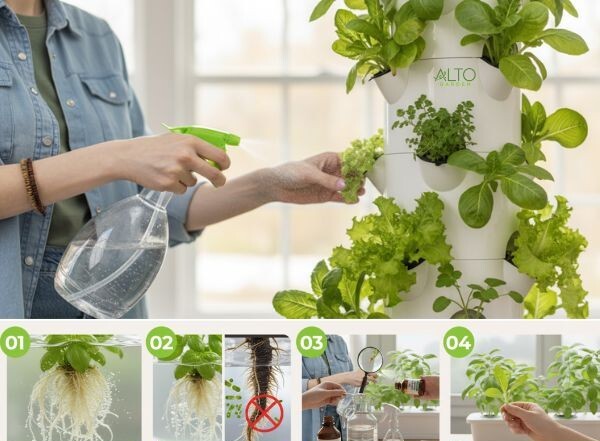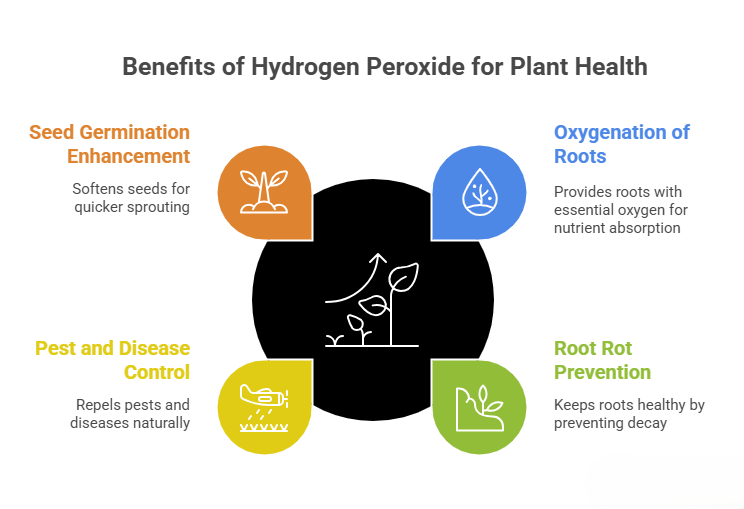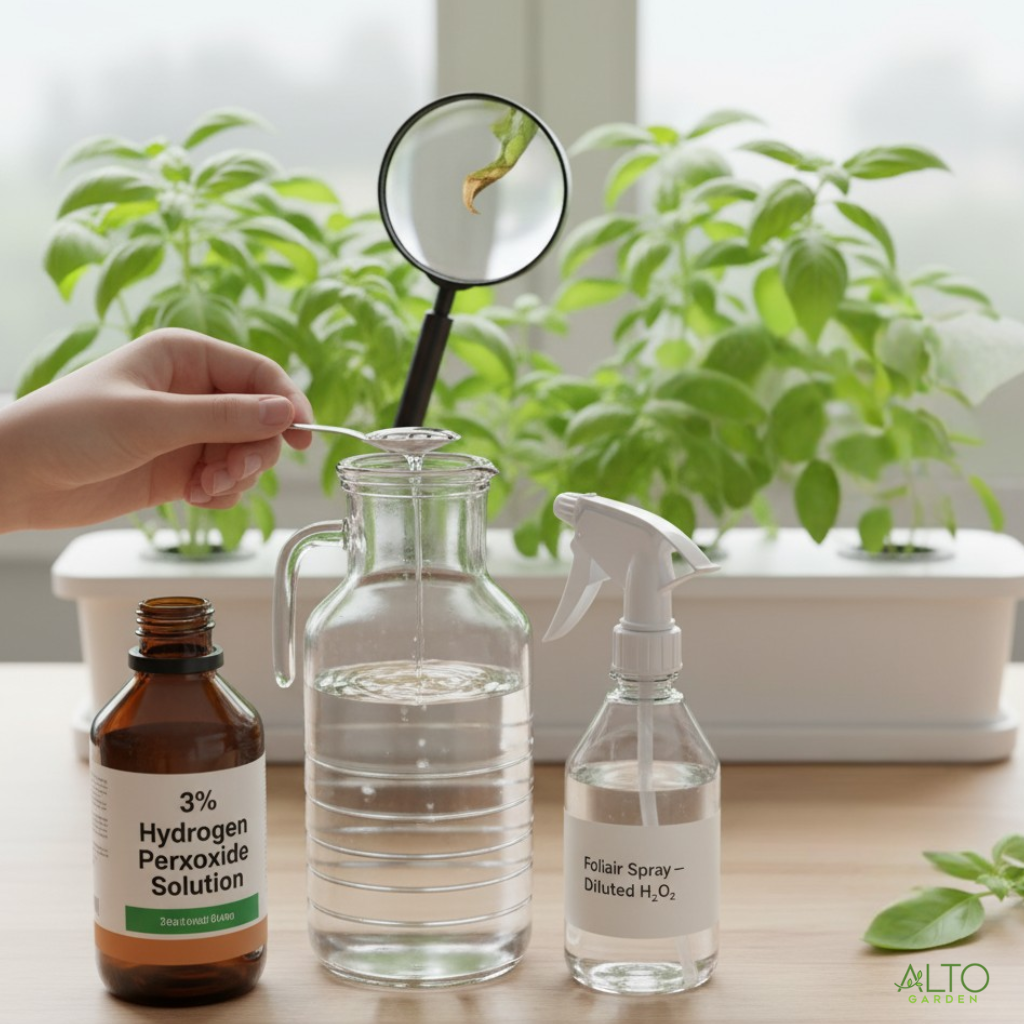Aug 9th 2024
Is Hydrogen Peroxide Safe for Plants? Safe Practices for Healthy Plants
Hydrogen peroxide, often abbreviated as H₂O₂, is a chemical compound that looks a lot like water but with an extra oxygen molecule. This tiny difference makes it powerful. In hydroponic gardening, it’s a bit of a superstar. You might be wondering why.
In simple terms, hydrogen peroxide's main job is to fight off harmful bacteria and fungi that can damage your plants. It’s also used to oxygenate the water, giving your plant roots the extra boost they need to absorb nutrients more effectively. Additionally, it can help prevent algae growth in hydroponic systems, keeping the environment clean and balanced.
So, is hydrogen peroxide safe for plants? That's the question we're here to answer. Read on to learn how to use it, its benefits, and any potential risks you should know. By the end of this article, you'll have a clear understanding of whether H₂O₂ deserves a spot in your hydroponic toolkit.

Key Takeaways
- Hydrogen Peroxide keeps hydroponic systems free from pathogens.
- Extra oxygen improves root development.
- Proper dilution is crucial to avoid damaging plant roots.
- Safety measures, such as using gloves and goggles, are essential when handling concentrated H2O2.
- Monitoring for plant stress helps ensure that plants receive the right amount of hydrogen peroxide.
- Hydrogen peroxide can combat algae in water reservoirs, ensuring a cleaner hydroponic system.
- Store hydrogen peroxide safely in a cool, dark place away from children and pets.
What Is Hydrogen Peroxide?
Hydrogen peroxide is essentially water (H2O) with an additional oxygen molecule, giving it the formula H₂O₂. This addition makes a world of difference. Pure hydrogen peroxide is a pale blue liquid in its concentrated form, but it’s typically sold diluted with water, appearing colorless.
You can find hydrogen peroxide in various concentrations. The most common one, about 3%, is often used for household cleaning and first aid. But when it comes to gardening, more diluted versions, like 0.1% to 0.5%, are preferable. These lower concentrations are gentler and safer for your plants, reducing the risk of potential damage. Using the right concentration ensures that your plants get the benefits without any stress.
How It Works in a Gardening Context
In a hydroponic setup, peroxide for plants works wonders. First, it helps combat harmful bacteria and fungi that could threaten your plants. No one wants root rot, right? Keeping these nasty elements at bay ensures your plants stay healthy and robust.
Moreover, H₂O₂ oxygenates the water, giving your plant roots that extra "oomph" they need to thrive. Think of it as adding a bit of superfood to their diet.
This additional oxygen helps roots absorb nutrients more efficiently, promoting faster growth, stronger stems, and overall plant vigor. It can also help reduce the stress your plants experience from fluctuating water conditions or minor nutrient imbalances.
Benefits of Using Hydrogen Peroxide on Plants
Oxygenation of roots: Using hydrogen peroxide in your hydroponic garden can be a real game-changer. One of the most significant benefits? By adding H₂O₂ to your water, you're essentially giving your plant roots a fresh boost of oxygen. This extra oxygen helps them absorb nutrients more efficiently, leading to faster growth, stronger stems, and healthier, more robust plants.
Prevents and treats root rot: Hydrogen peroxide is also a fantastic tool for preventing and treating root rot. Nobody wants to deal with mushy, decaying roots that can wreak havoc on your garden. By keeping harmful bacteria and fungi at bay, H₂O₂ ensures your plants' roots stay clean, healthy, and resilient.
Pest and disease control: Hydrogen peroxide acts almost like a natural pest repellent. Its antibacterial and antifungal properties can help keep unwanted visitors, such as fungus gnats or mold, away from your precious plants. This means you can enjoy a lush, green garden without constantly worrying about pests or diseases sneaking in.
Seed germination enhancement: If you've ever struggled with getting seeds to sprout, hydrogen peroxide might be the missing piece. Soaking seeds in a diluted H₂O₂ solution can help soften their outer shell, allowing water to penetrate more effectively and encouraging quicker, more uniform germination, giving your seedlings a strong head start.
Boosts overall plant vigor: With stronger roots, fewer pests, and faster germination, plants are healthier, more robust, and better equipped to thrive in your hydroponic setup.

Safe Practices for Using Hydrogen Peroxide
When adding H₂O₂ to your hydroponic system, proper dilution is a must. Do not add hydrogen peroxide to your hydroponic reservoir in concentrated form - make sure to dilute it first.
General use: Mix 2–3 teaspoons of 3% hydrogen peroxide per gallon of water. If you’re dealing with stubborn root rot, you can go a bit stronger but always dilute it to ensure the roots aren't burnt.
Foliar spray: A light foliar spray might require an even more diluted solution, say a teaspoon of 3% hydrogen peroxide per gallon of water. Always apply during cooler parts of the day to avoid leaf burn.
Checking on your plants: After using H₂O₂, look for signs of stress in your plants, like leaves that are turning brown or wilting. If you need to, change the amount or how often you do it to keep plants healthy.

Methods of Application
There are several ways to introduce hydrogen peroxide to your plants. As a foliar spray, it can keep leaves clean and mold-free. Simply mist your plants lightly, avoiding direct sunlight moments after application to prevent leaf burn. For a root soak, add your diluted hydrogen peroxide directly to the nutrient solution. This method is perfect for oxygenating the roots and preventing root rot.
If you notice any signs of disease or pests, a gentle hydrogen peroxide solution applied directly to the affected area can work wonders.
Potential Risks and Precautions
One of the main concerns with using hydrogen peroxide for plants is overuse. If you add too much, it can damage your plants’ roots, leading to something you'd rather avoid- plant stress or even death. So, always stick to recommended dilution ratios to ensure H₂O₂ is safe for your plants.
When handling peroxide for plants, safety comes first. It might seem benign, but concentrated H₂O₂ can irritate your skin and eyes. Always wear gloves and goggles when mixing and applying the solution, and store it in a cool, dark place away from kids and pets.
Look out for signs of plant stress. If you notice browning or wilting leaves after applying hydrogen peroxide, it’s a signal to scale back. Your plants might be telling you they’ve had too much. Furthermore, observe root color and texture - healthy roots are white and firm, not mushy or discolored. Following these precautions, is peroxide good for plants? remains a “yes” rather than a risky experiment.
Practical Applications in Hydroponics
Hydrogen peroxide is a versatile solution that can help maintain a clean hydroponic system, keeping pathogens at bay. Got a bit of algae growing in your water reservoir? A touch of hydrogen peroxide for plants will clear it right up. And it’s not just about cleanliness but a boon for plant health and growth.
By introducing hydrogen peroxide into your hydroponic setup, you’re giving your plants an oxygen-rich environment that their roots will absolutely love. This extra oxygen supports healthy root development, leading to more robust plants.
Curious to learn more or ready to take your hydroponic gardening to the next level? Check out our resources and explore products at ALTO Garden. Happy gardening!
FAQs
- Is hydrogen peroxide safe for plants?
Yes, hydrogen peroxide is safe for plants when it is used in the right amounts. It can even help roots get more oxygen and keep plants from getting sick. - How often should I use hydrogen peroxide in my hydroponic system?
A good rule of thumb is every 1 to 2 weeks. For treating algae or root rot, it can be used more often, but only at safe levels of dilution. - Can I use household hydrogen peroxide for plants?
Yes, the common 3% solution is good for both root oxygenation and foliar sprays as long as it is mixed with the right amount of water. - 4. Is peroxide good for plants besides hydroponics?
Absolutely. It can be used in soil gardening to combat root rot, enhance seed germination, and control fungal issues.




